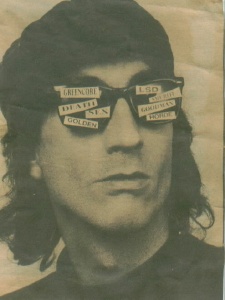Aidan Curran posted on November 25, 2007 15:17
 We told you a long time ago about how the new album by Johnny Hallyday (right) would feature a song called 'I Am The Blues' written especially by Bono. Some of our readers couldn't believe it. Others wondered if this were part of some mutual tax loophole they found.
We told you a long time ago about how the new album by Johnny Hallyday (right) would feature a song called 'I Am The Blues' written especially by Bono. Some of our readers couldn't believe it. Others wondered if this were part of some mutual tax loophole they found.
Well, France's rock idol has just released said long-player, 'Le Coeur d'Un Homme' - and sure enough, the last track is 'I Am The Blues', sung in English by Johnny, written by Bono and... Simon Carmody!
 The Golden Horde singer (below right), Dublin's greatest rock ligger, is sure to coin it from such a lucrative contribution - Johnny stills sells loads of records in France. Simon, make sure the two lads give you some tips on keeping as much of the royalties as possible.
The Golden Horde singer (below right), Dublin's greatest rock ligger, is sure to coin it from such a lucrative contribution - Johnny stills sells loads of records in France. Simon, make sure the two lads give you some tips on keeping as much of the royalties as possible.
As for the song itself, its lyrics feature a cri du coeur from the two ageing accountant-friendly rockers: "Falling through the cracks / The ticker tape and tax". The brazen chancers!
 The rest of the song aims to capture Johnny's Frenchness (even while the man himself is busy looking into his Belgian/Swissness). "I'm as blue as the Cote d'Azur", Bono has him sing, forgetting that the Cote d'Azur is grassy-green and sandy-brown and that the Mediterranean would be better for a bit of blueness.
The rest of the song aims to capture Johnny's Frenchness (even while the man himself is busy looking into his Belgian/Swissness). "I'm as blue as the Cote d'Azur", Bono has him sing, forgetting that the Cote d'Azur is grassy-green and sandy-brown and that the Mediterranean would be better for a bit of blueness.
Eventually Johnny decides that passport-shopping isn't for him: "I stood up to dance / I lost my balance / But my faith in France / Some things you can't lose". True; but other things you can lose, e.g. up to 60% of your earnings under the French tax system. Maybe it was his bank balance that he lost?
No video yet, but thanks to the magic of home-made YouTube you can listen to 'I Am The Blues' while you stare lovingly at the cover of Johnny's new album. There are rumours of tour dates in Monaco, the Isle of Man, Andorra, Switzerland and Bermuda:
More ...
[Read More...]